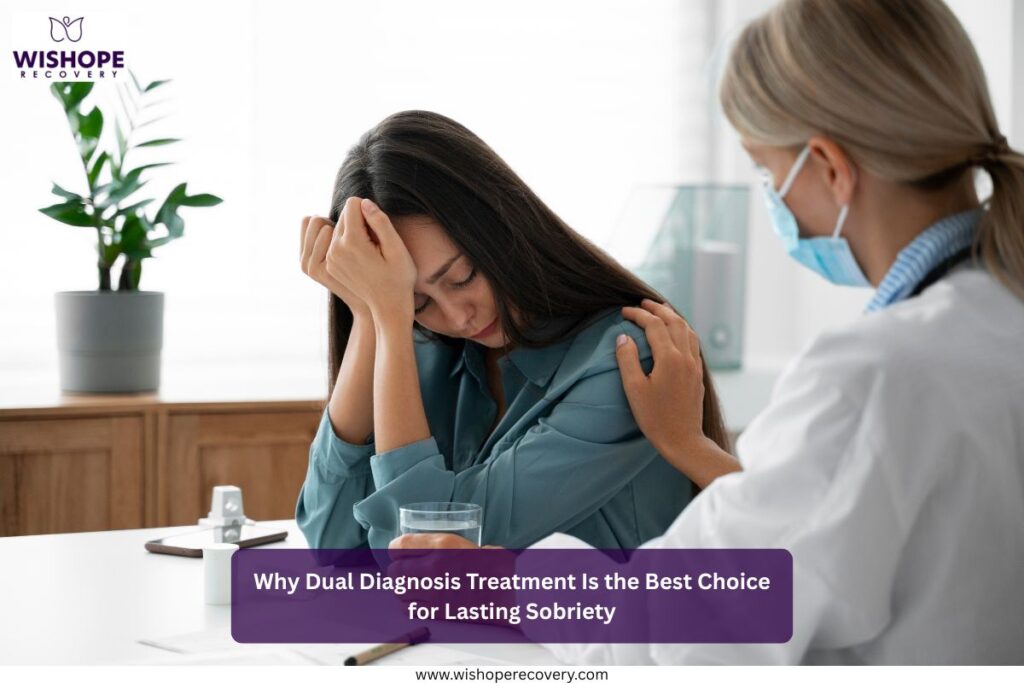Many people have a much more complicated bout with addiction than simple substance usage. The truth is that many live with some sort of underlying mental health situation: depression, anxiety, PTSD, bipolar, to mention a few. This combination is called co-occurring disorder and requires a special kind of treatment known by the term “dual diagnosis.”
If you or someone you are close to is going through an addiction treatment and trying to help find the program that will lead toward genuine, long-term recovery, then there is hardly anything more suitable and effective than dual diagnosis treatment.
What Is Dual Diagnosis?
Dual diagnosis Treatment is the simultaneous diagnosis of a mental health disorder and a substance use disorder. In most cases, one disorder enables the other. A person may take a drink to escape their anxiety and, over time, they develop a physical dependence to alcohol, which perpetuates an increased level of anxiety. Without treatment for one disorder and an associated treatment plan for the other disorder, there is a very real chance that the person will find themselves in a perpetual cycle of relapse and stopgap measures.
Why Dual Diagnosis Treatment is More Effective
1. Treats the Entire Person, not just the Addiction
Most addiction treatment programs base their treatment plan on addiction alone. If there are some mental health conditions, not only are they not treated, but they also will be the motivating factor for continued substance use behaviors. Dual diagnosis inpatient treatment offers an integrative care model, providing therapy, medication management, and behavioral support for both addiction and mental health conditions in one treatment program.
2. Improves Long-Term Recovery Rates
Research shows that people who participate in residential dual diagnosis treatment are more likely to maintain sobriety. For people who experience co-occurring substance use and mental diagnosis have tools when they leave to help manage both the emotional triggers and the physiological cravings. And treatment is durable from a dual diagnosis perspective. Treatment for one while not addressing the other is less likely to have a favorable outcome because of how each reinforces and perpetuates in their own ways a relapse.
3. Provides Flexible Levels of Care
Starting treatment can require more time and support, but there are also options like outpatient dual diagnosis that offer flexibility. For people who may need to see patients, run a household, or provide for their family while receiving structured therapy and designed support, dual diagnosis allows for all those to be integrated. More levels of customization with treatment will only improve chances for long-term treatment.
4. More Accessible Care Options
In large part thanks to calls to action and heightened awareness and advocacy – preventative and wellness-based services are more accessible than ever before. Finding dual diagnosis programs that are compassionate, evidence-based, and focused on whole-person healing is easier than ever. Many programs now offer telehealth, along with community-based services, and include sliding-scale fees to meet those in need.

Residential vs Outpatient Dual Diagnosis Treatment
- Residential Dual Diagnosis Treatment:
It makes sense for those with severe, chronic,or long-term addiction and mental health challenges. It will provide 24/7 medical and emotional support in a safe, structured setting. Residential treatment programs are a great option if someone is in crisis or needs to be taken out of their high-risk home environment.
- Outpatient Dual Diagnosis Treatment:
Great option for those with a solid support system at home or those who are stepping down from inpatient hospitalization. Outpatient treatment also offers scheduling flexibility, and still addresses the dual diagnosis element with scheduled therapy sessions and group work.
Choosing a Dual Diagnosis Program:
When looking for dual diagnosis programs near me, you want to consider the following:
- Licensed mental health and substance abuse professionals
- The use of evidence-based therapies including CBT, DBT, trauma-informed care
- Treatment plans that are individualized to the client
- The availability of continuum of care (inpatient, outpatient, aftercare)
- Family therapy and support services
At Wishope Recovery, we are proud to offer compassionate and comprehensive dual diagnosis inpatient treatment. Our specialized staff know that maintaining sobriety is more than just detox; it’s healing the mind, body, and spirit. Whether you’re just getting started or need help figuring out the next steps, our residential dual diagnosis treatment programs will get you on the path to lasting recovery.
Take the First Step Today
If you are fighting against addiction and mental health illness for yourself or someone you love, do not wait. Dual diagnosis treatment will be the first step towards believing in your/your loved one’s healing journey to a life of purpose, peace and sobriety.
Call Wishope Recovery today to discover more about our dual diagnosis programs near you and take the first step to a new take on life.

